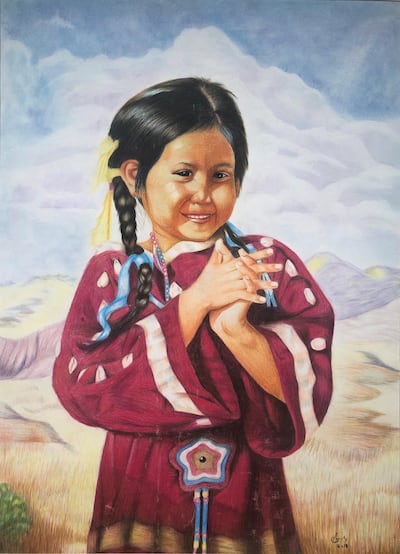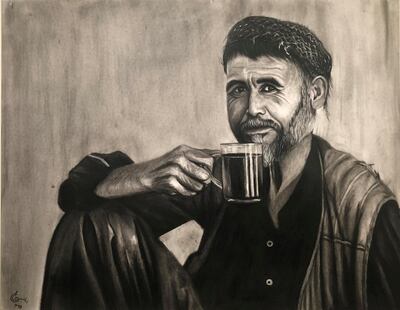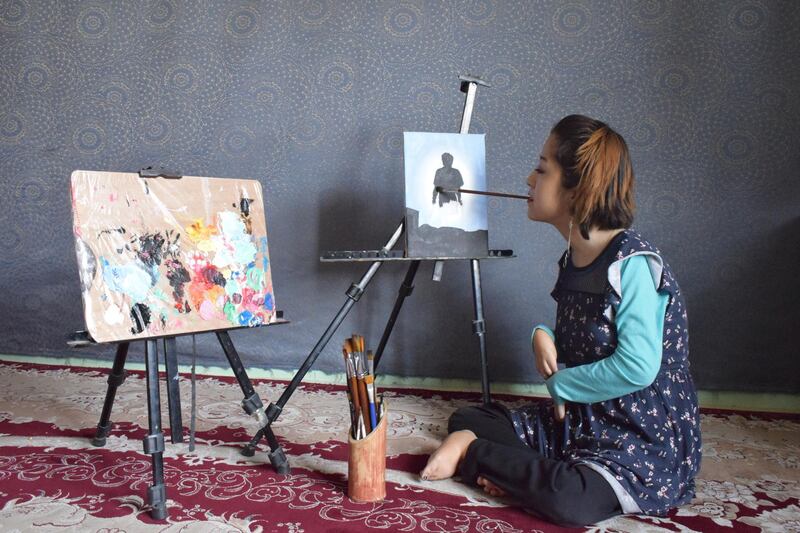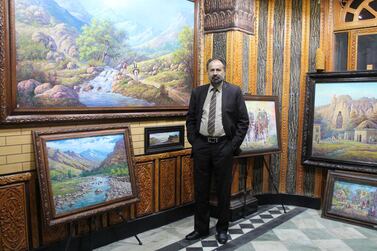Robaba Mohammadi sounds like she could almost burst with enthusiasm. She can hardly contain her excitement about her trip to Abu Dhabi for the Made in Afghanistan exhibition, which opens to the public today. Her work is being shown alongside 10 other Afghan artists, including Nabila Horakhsh, who also curated the exhibition, Shamsia Hassani, Afghanistan's first female graffiti artist, and Jahan Ara Rafi, who produces modern art and is an advocate for more women in the creative industries.
The journey to the UAE will be only Mohammadi's second trip abroad and will bring her closer to achieving her dream of spreading a message of hope through art across the world. "I am extremely nervous and excited," Mohammadi, 19, tells The National. "I really feel proud. That girl who was in a corner of a home, who didn't understand anything about arts, will now have her art displayed in a city that exhibits the best artists and the best arts."

Mohammadi was not always this motivated and joyous. Born with a condition that has left her unable to walk or use her hands, she spent the majority of her early life at home, unable to even attend school due to a lack of disabled-friendly infrastructure or facilities. "I didn't see anyone, I wasn't in society," she says. "I would go so long without fresh air. I would go into our yard maybe once a month, if that."
The many days of loneliness drove her to find ways to stay busy and that is when she found her passion. The first time Mohammadi picked up a pencil she used a foot, but she says she found it difficult. With the encouragement of her father, she then used her mouth and found that it was a better fit. "I gave up so many times," she said of her early attempts.
But she kept practising until she could draw a straight line. She started to learn from an art book gifted to her by a friend and began to excel, practising for hours every day.
Her detailed charcoal drawings of people, objects, animals and pencil flowers gradually earned her fame by the age of 16.
Mohammadi then began training with professional artists and improved her technique and, before long, it was she who was teaching art and encouraging other people with disabilities to find their voices.

Today, Mohammadi uses oil paints to portray streets in Afghanistan and the country's people. She also paints people with disabilities in bold colours and often in landscapes.
About eight months ago, Mohammadi, along with her older brother, Ali Reza, and one of her younger sisters, Shakila, set up the Robaba Cultural and Art Centre in Kabul to centralise their work within the community.
The centre aims not only to use classes and activities to help expand arts and culture in a community that has endured conflict for the past four decades, with a focus on people with disabilities, but Mohammadi says she also wants it to become a hub that can help to counter the growing sense of depression among young people living in the Afghan capital.
Mohammadi is a regular speaker at the centre and she says that young Afghans are the key to changing traditional perceptions of disabilities. "Our aim is to help those who don't have hopes or plans for their future and I am very focused on people with disabilities," she says. "If young people aren't active in society, if they can't make changes in the culture and in their communities, or work towards changing people's perceptions, then who is left to make those changes?"
Changing people's minds is not always easy in Afghanistan's conservative society, especially when it comes to issues focused on women, but Mohammadi says she is determined to break down barriers. She has convinced parents to bring their daughters to the centre for music and singing lessons, something that is almost unheard of elsewhere in the country.
Mohammadi finances the centre herself and while she admits the bills do add up, she is hopeful that future commissions will be enough to help her keep its doors open. Even so, the artist allows people from low income backgrounds to use the centre at a reduced rate or even for free.
She says she has even bigger ambitions beyond the Kabul centre. "People with disabilities can't study in Afghanistan," she says. "Most places, especially schools and universities, are not disabled friendly. This is why the majority of people with disabilities are illiterate. One of my dreams is to one day create a university and school for people with disabilities."
Meeting politicians, attending events to remove the stigma associated with disability, holding motivational seminars, teaching and creating art, taking singing lessons and most recently learning English are only some of the activities that keep Mohammadi busy. And she says she wants to do even more. Despite everything she has achieved so far, she says she hasn't been able to escape prejudice and remains aware that when some people see her physical condition, they think that she cannot achieve her dreams.
"When they see me they think I am this unable, poor, unfortunate person, but that's not me," she says. "I really want to prove to them that I am not unable at all. Disability is not limitation, but you can't prove that to people just passing you in a street."
For now she says she is focused on bringing her art and message of hope and resilience to the Made in Afghanistan exhibition at the Etihad Modern Art Gallery. "I'm looking forward to meeting people and artists and practising my English with them," she says. "I never imagined that arts would open the doors of society to me."
The Made in Afghanistan exhibition is being held at the Etihad Modern Art Gallery, Al Bateen, Abu Dhabi, until January 16, 2020






